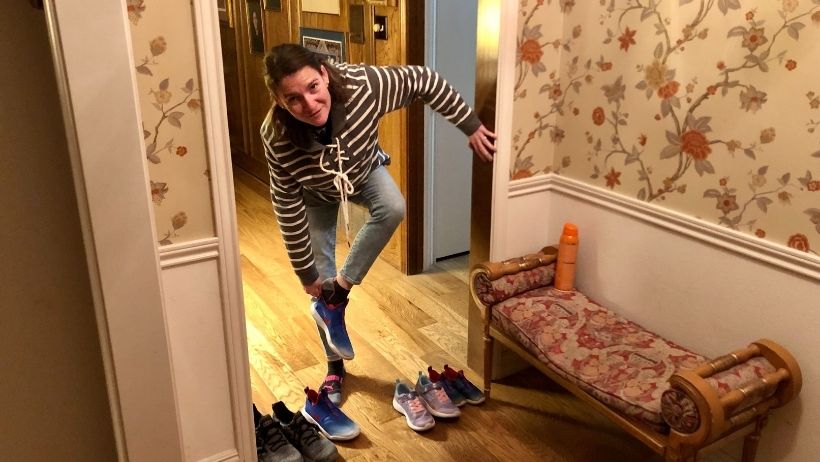We renovated our house more than four years ago, and part of the renovation included adding a mudroom. So why, after all this time, do my kids still forget to put their shoes in their cubby in the mudroom when we come in? The joy of having a mudroom (and individual cubbies) is that each family member has their own space for things, and the rest of the house stays cleaner and relatively free of mud. However, to be fair to them, the “shoes off at the door” policy wasn’t mandatory year round when I was growing up. In our house we had a bench by the garage door that was mostly used in the winter months for taking off shoes caked in mud and snow (and probably soaked). Needless to say, I didn’t always remember to take my shoes off at the bench either.

As an adult, on the other hand, I can’t wait to remove my shoes. I love nothing more than a cozy pair of slippers in winter and the cool floor on my feet in summer. Both of those feelings connect me to the feeling of being home, in my own space. As much as I’d love to be barefoot at work or wear slippers in the office some days, I don’t, and having that separation is helpful. Although there are exceptions in some cultures and religions, the removal of shoes is usually reserved for private spaces. But that’s not the case in this week’s Torah portion.
This week’s parshah, Shemot, serves as the turning point from the leadership of Abraham, Isaac, and Jacob to that of Moses. Shemot leads us quickly through the change of rulers in Egypt as a new Pharaoh who isn’t so keen on the Israelites decrees that all males born should be put to death. Thankfully the midwives ignore this decree, and Moses is kept alive. As an adopted Egyptian, Moses joins the palace, but later learns he’s an Israelite. He flees out of fear for his life, marries a Midianite woman, and starts his own family.
As Moses is out tending to the flocks of his father-in-law Jethro, he happens upon a special place, the mountain of God, Horeb. He sees an angel of God in a blazing fire that is engulfing a desert bush, but somehow not consuming it. Moses is mesmerized. As he’s contemplating what is happening before his eyes, God calls out to Moses and makes a peculiar request for someone standing in the middle of the desert. “Remove your sandals from your feet, for the place where you stand is holy ground.”
Why on earth would God ask Moses to take off his shoes? Yes, the presence of God is pretty significant, but why here and not at some of the other holy sites previously visited in the Torah? Perhaps this is a moment when Moses needed to be grounded, literally. After all, this is the moment God calls out to Moses and informs him that he’s going to be the one to lead the entire Israelite nation out from Egypt. Feeling the earth on his feet is a reminder that God is connected to him and the line of creation from Adam to Abraham to Moses.
When we take off our shoes, it’s not just that the space we’re in is holy and sacred; it’s that we ourselves are holy, and making a direct connection – holy to holy – is one small way we can connect ourselves to everyone and everything that came before us.



